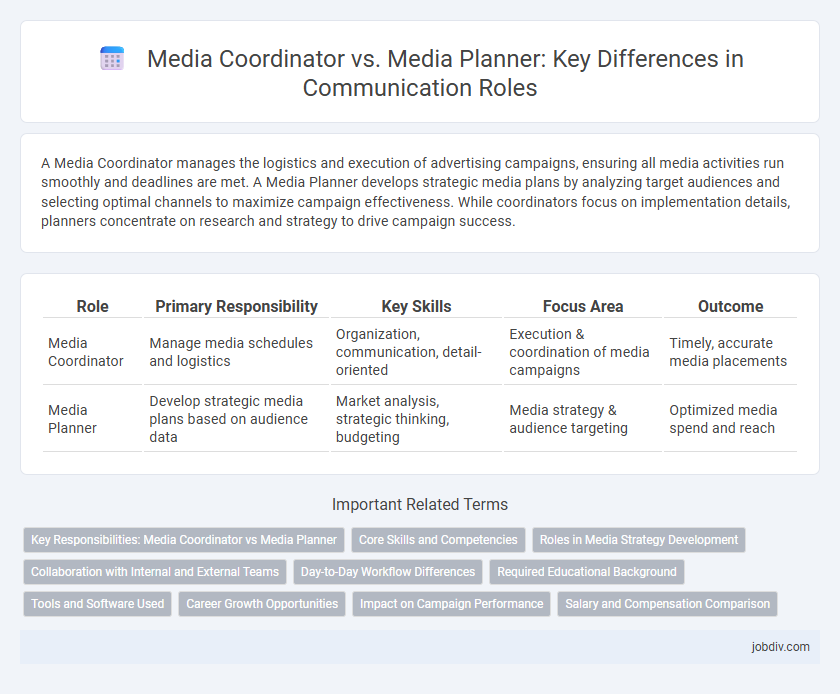A Media Coordinator manages the logistics and execution of advertising campaigns, ensuring all media activities run smoothly and deadlines are met. A Media Planner develops strategic media plans by analyzing target audiences and selecting optimal channels to maximize campaign effectiveness. While coordinators focus on implementation details, planners concentrate on research and strategy to drive campaign success.
Table of Comparison
| Role | Primary Responsibility | Key Skills | Focus Area | Outcome |
|---|---|---|---|---|
| Media Coordinator | Manage media schedules and logistics | Organization, communication, detail-oriented | Execution & coordination of media campaigns | Timely, accurate media placements |
| Media Planner | Develop strategic media plans based on audience data | Market analysis, strategic thinking, budgeting | Media strategy & audience targeting | Optimized media spend and reach |
Key Responsibilities: Media Coordinator vs Media Planner
A Media Coordinator manages the logistical aspects of advertising campaigns, including scheduling media buys, coordinating with vendors, and ensuring timely delivery of materials. In contrast, a Media Planner conducts market research to identify target audiences, develops media strategies, and selects appropriate platforms to maximize campaign effectiveness. Both roles collaborate closely, with the Media Planner focusing on strategy and analysis while the Media Coordinator handles execution and operational details.
Core Skills and Competencies
A Media Coordinator excels in project management, scheduling, and communication skills to ensure seamless execution of media campaigns, often acting as the liaison between clients, vendors, and internal teams. In contrast, a Media Planner specializes in data analysis, audience research, and strategic thinking to develop effective media buying strategies that maximize reach and ROI. Both roles require proficiency in digital tools, but the Media Planner emphasizes analytical skills while the Media Coordinator prioritizes organizational and interpersonal competencies.
Roles in Media Strategy Development
Media Coordinators manage the execution and logistics of media campaigns, ensuring seamless communication between clients, agencies, and media outlets. Media Planners focus on developing strategic media plans by analyzing target audiences, selecting appropriate channels, and optimizing budget allocation to maximize campaign effectiveness. Both roles collaborate closely, with Media Planners setting strategic direction and Media Coordinators facilitating operational implementation within the media strategy development process.
Collaboration with Internal and External Teams
A Media Coordinator manages communication between internal marketing teams and external vendors to ensure smooth campaign execution and timely delivery. Media Planners collaborate closely with creative, sales, and analytics departments to develop strategic media plans that align with business objectives and target audience insights. Both roles require seamless teamwork and clear communication to optimize media buying and maximize campaign effectiveness.
Day-to-Day Workflow Differences
A Media Coordinator manages the execution of media campaigns by liaising with vendors, scheduling ads, and ensuring timely delivery of materials. In contrast, a Media Planner focuses on strategizing media placements by analyzing audience data, selecting appropriate channels, and developing budget allocations. The day-to-day workflow of a Media Coordinator is operational and detail-oriented, while the Media Planner's tasks are analytical and strategic.
Required Educational Background
Media Coordinators typically require a bachelor's degree in communications, marketing, or public relations to efficiently manage media campaigns and coordinate between departments. Media Planners often need a background in advertising, media studies, or business with strong analytical skills to develop strategic media buying plans. Both roles benefit from coursework in digital marketing, audience analysis, and media strategy to optimize campaign effectiveness.
Tools and Software Used
Media Coordinators primarily use project management tools like Trello, Asana, and Microsoft Excel to organize schedules, coordinate team tasks, and track campaign progress. Media Planners rely on specialized software such as Nielsen Media Impact, STRATA, and Comscore to analyze audience data, forecast media performance, and optimize budget allocation. Both roles increasingly utilize digital analytics platforms and CRM systems to enhance collaboration and data-driven decision-making in media campaigns.
Career Growth Opportunities
Media Coordinators cultivate foundational skills in campaign logistics and stakeholder communication, positioning themselves for advancement into strategic roles. Media Planners leverage data-driven insights and audience analytics to design targeted advertising strategies, often progressing into senior marketing or digital strategy positions. Career growth in these fields depends on expertise in media buying, campaign optimization, and proficiency with emerging digital platforms.
Impact on Campaign Performance
Media Coordinators streamline communication between creative teams and media buyers, ensuring timely asset delivery and accurate campaign execution, which enhances overall campaign efficiency. Media Planners analyze audience data and select optimal channels, targeting strategies, and budget allocation to maximize reach and engagement, directly driving campaign performance. Effective collaboration between Media Coordinators and Media Planners results in improved campaign ROI through synchronized strategy implementation and operational precision.
Salary and Compensation Comparison
Media Coordinators earn an average salary ranging from $40,000 to $55,000 annually, while Media Planners typically command higher compensation, with salaries between $60,000 and $85,000 per year due to their strategic role in campaign development. Media Planners often receive performance bonuses and additional incentives linked to campaign success, whereas Media Coordinators' compensation is generally fixed with occasional overtime pay. Geographic location and industry specialization further influence the salary disparity, with Media Planners in major markets earning significantly more than Media Coordinators in smaller regions.
Media Coordinator vs Media Planner Infographic

 jobdiv.com
jobdiv.com